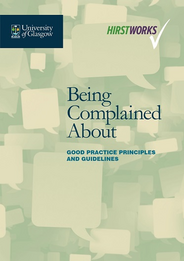Being complained about can and does have negative impact. An empirical research project led by Dr Chris Gill (University of Glasgow) and Carolyn Hirst (Hirstworks), in partnership with Jane Williams (Queen Margaret University) and Dr Maria Sapouna (University of West of Scotland) investigated the effects of complaints on staff. It included an online survey of 132 individuals who had been subject to a complaint and follow-up qualitative interviews with 16 of them.
The key finding of the research was that being complained about affects the health and well-being of employees, their work practice, and the way they perceive service users. 71% reported their work practice was negatively affected by a complaint, 67.2% reported their health and well-being was affected, and 61.2% reported their attitude to service users being affected. These important findings echo other studies that have been conducted on the effect of complaints, particularly in the healthcare setting.
Dr Gill and his colleagues argue that current complaint systems in the UK are overly focused on the needs of those who complain and that the needs of those who are complained about have been ignored. This not only has negative consequences for individuals and organisations, but if left unremedied could lead to reduced public service performance, poor future service delivery, and a failure to capitalise on the potential for using complaints as a source of learning and improvement.
To address this, the researchers have developed guidance – “Being Complained About – Good Practice Guidelines” – in collaboration with practitioners. The guidance is designed to improve the way in which public service organisations handle complaints and to help them provide better support to staff that have been complained about. It provides some principles and guidelines which an organisation may wish to adopt as part of their existing complaint handling arrangements.
The guidance sets out four principles for dealing with complaints about employees – fairness, confidentiality, transparency, and efficiency – and provides guidelines relating to the provision of support to employees, how they should be involved in the complaint process, and how they should be communicated with. The researchers are currently piloting the guidelines with public service organisations and are also collaborating with ombudsman offices to help them develop their practices in this area.
The researchers are very interested in working with ombudsman offices working in other jurisdictions. For more information, please contact Dr Chris Gill.
 Downloads
Downloads
-
How do complaints affect those complained about? An empirical investigation into the effects of complaints on public service employees. Research Report (396,6 KiB)

-
Being Complaint About - Good Practice Principles and Guidelines by Dr. Chris Gill (University of Glasgow) & Carolyn Hirst (Hirstworks) (3,6 MiB)


